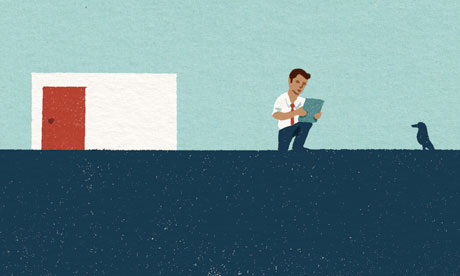
In 2003, when the American author Jonathan Rauch published in the Atlantic magazine an essay entitled Caring For Your Introvert, the response was "astonishing". Years later, it was still the magazine's most popular piece online. "I have shrunken and laminated 100 copies and carry a few in my shirt pocket," wrote one reader. "Now, when someone perplexed by 15 seconds of silence asks, 'What are you thinking about?' I simply hand him or her a copy and retire to the basement." I predict a similar fate for Susan Cain's forthcoming book Quiet: The Power Of Introverts In A World That Can't Stop Talking, which rails against the "New Groupthink" of a culture fixated on teamwork, open-plan offices and the wisdom of crowds. Introverts will flock to bookshops to buy it, I suspect. Except not in flocks. Maybe they'll just download it to their e-readers in private.
Rauch's essential point was that introversion doesn't mean being shy or misanthropic; what defines an introvert is finding social interaction tiring and solitude revitalising, while for extroverts it's the reverse. Cain insists, meanwhile, that solitude is crucial to creativity. For every charismatic Steve Jobs, there's a retiring Steve Wozniak; idea-sharing works best when we also protect the interior quiet in which, for many, inspiration first arrives. Research suggests group brainstorming doesn't work and that open-plan workspaces are associated with high blood pressure and conflict. "It's one thing to associate with a group in which each member works autonomously on his piece of the puzzle," Cain notes, but "another to be corralled into endless meetings… in offices that afford no respite from the noise and gaze of co-workers."
To be fair, there's plenty of research attesting to the benefits of teamwork, too; as with all such questions, it's a matter of personalities. What makes the introversion/extroversion standoff unique is how, by virtue of the traits involved, the extroverts get to define the debate. It's extroverted workers who excel in teams, become managers and end up in charge of office layouts. (Since they're better at claiming credit, they're probably more likely to get promoted per se.) Likewise, it's people inclined toward publicness, like the new-media guru Jeff Jarvis, who give talks promoting their view; advocates of living more discreetly stay off the conference circuit. If teaching methods increasingly favour extroverts, as Cain argues, maybe it's because teachers and education ministers belong to professions that reward extroversion.
Gripes about open-plan offices and "digital distraction" tend to go hand in hand, but the internet is a sort of saviour here. Online brainstorming is the only kind that does really work – introverts get to stay behind their screens – while email, unlike the phone, is "serial communication": you can revise before hitting send. What's needed most, though, is mutual understanding, and here another problem rears its head: "Extroverts," Rauch observes, "are easy for introverts to understand, because extroverts spend so much of their time working out who they are in voluble, frequently inescapable, interaction with other people." He thinks the opposite's not true: extroverts can't imagine wanting to be alone, and introverts don't help by preferring not to talk about it. If you're an extrovert who manages introverts, you have to start from the assumption that you haven't a clue. And that a brainstorming session in the conference room might not be the best way to find answers.
oliver.burkeman@theguardian.com; twitter.com/oliverburkeman

